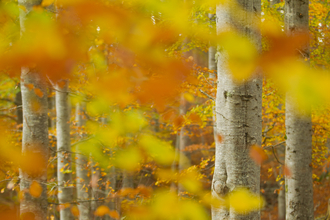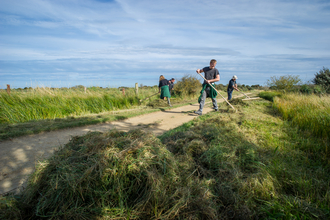Today is World Mental Health Day and a timely opportunity to remind ourselves that spending time in the natural environment improves our mental wellbeing.
Seeing birds near our homes, walking through green spaces filled with wild flowers, and along rivers that are clean and clear reduces stress, fatigue, anxiety and depression.
It's great to see that the Government has recognised this. Their 25 Year Environment Plan makes it clear: “Spending time in the natural environment – as a resident or a visitor – improves our mental health and feelings of wellbeing. It can combat loneliness and bind communities together.[1],[2]”
The Wildlife Trusts look after and connect people to places and activities where they feel happier, uplifted, less stressed and connected to other people – a provider of ‘natural mental health services’, that work alongside and complement mainstream health services. For example:
Hampshire and the Isle of Wight Wildlife Trust have teamed up with Portsmouth City Council run the ‘Green Space Challenge’, a series of walking events aimed at getting people out of their homes to explore and celebrate their local green spaces. A choice of long and short routes, that take in family-friendly wildlife-themed activities along the way, means that everyone benefits. Free pedometers are included, so people can track and build on their progress.
"Since I retired 7 years ago this project has been essential to my wellbeing – mental and physical"
Warwickshire Wildlife Trust work in partnership with Coventry and Warwickshire Mind, to deliver The Environment and Me, a programme that helps people with poor mental health come together to look after the rivers, woodlands, parks and green spaces of Coventry. People like Jon Dancer, a 35-year old man who found his life was spiralling out of control. He had reached rock bottom and considered ending it all. He found respite in nature. He tells his story in This film.
“It really made me realise what I'd actually got in life”
Jon Dancer
Wiltshire Wildlife Trust’s ‘Wellbeing Programme’ engages those struggling with mental health issues such as anxiety and depression through positive interactions with nature. From hands-on conservation projects to wildlife walks and nature crafts, The Wellbeing Programme provides an escape from the stresses of everyday life, and helps participants embrace getting outdoors as part of their approach to wellbeing.
"The programme has changed my life. I would definitely recommend it as the benefits of being out with other people, with supportive and understanding staff are huge". Owen, who suffered with post-traumatic stress disorder.
This is just a flavour of what happens across The Wildlife Trusts.
What do we want?
The time has come for ‘green prescribing’ initiatives like these to become an integrated part of our health services, so that we prevent more people from needing expensive or unnecessary medication or therapy. We are not calling for a cut in traditional healthcare services, but if we are serious about prevention, then something needs to change. In November, the NHS in England launches their 10-year plan, and it could do a lot worse than allocate a small proportion of their budget to programmes across the sector, that are not only good for the participants health, but also create ‘health assets’ for the wider public to use, in the form of nature reserves, national parks, canals, rivers and community allotments.
From TCV’s Green Gyms, to the RSPB, who recently teamed up with NHS Shetland to ‘prescribe nature’, wherever you look, there is a supply of wonderful places with inclusive and supported activities to get our nation outside, active and well again. What is needed now is a brave decision from the NHS to commit funding to a national programme of prevention at scale. And it’s not just us greenies saying so:
Mind, The Mental Health Charity, has demonstrated that participating in green exercise activities provides substantial benefits for health and well-being. They found that Ecotherapy could contribute to reducing the £338 million that antidepressant prescription costs the public health service. As Gavin Atkins, Mind’s Head of Communities says:
“At a time when commissioners face financial, social and environmental challenges in meeting the health needs of local people, nature based interventions need to be seriously considered as a preventative service, an early intervention, and treatment option – all in one service”
[1] Evidence statement on the links between the natural environment and human health (The University of Exeter and Defra, 2017)
[2] Urban Green Spaces and Health: World Health Organisation Regional Office for Europe, 2016, 9-10
3 The health and wellbeing impacts of volunteering with The Wildlife Trusts; School of Sport, Rehabilitation and Exercise Sciences; Essex University (2017)



